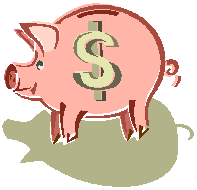
For the educator who wants to
teach basic money skills and more.
Money Lesson Plans for
Teachers and Educators - Materials - Money Lessons for Students - K12
|
YOU MUST SIGN-IN TO VIEW THE
LESSONS.
If you are a member,
click here to sign in.
Below is a
sample, and only a part, of our Money Introduction lesson.
If you would like to see the
lesson in full, and gain access to our content, then
CLICK HERE
|
| |
 |
MONEY LESSON
PLAN:
Money Introduction
- An introduction to
money: What is money, how do you get it, and what do you use it
for?
- This lesson includes slides and comments for
each slide. No prior knowledge or preparation is necessary.
-
Appropriate for class grades 1 to 5.
|
LESSONS LEARNED:
-
What is money, why do we have it, how do we
use it, and how do we get it?
-
Basic money math.
-
Concept of bartering.
-
Difference between goods and services.
DIRECTIONS:
-
Print out the slides.
-
Follow the comments.
When
presenting this lesson to your class, you may use the
comments in the red box with each slide, or
improvise and make up your own comments and discussion. Our comments are
only presented here to help you with your instruction.
-
Discussion questions
Used for encouraging discussion related to each slide.
MATERIALS:
-
Slides: print out each of the
slides below.
-
Coins, dollar bills (Teacher and students). Or use our play money
worksheets. Coins or
bills.
-
Canned or preserved food, books, or other items to demonstrate bartering.
ACTIVITY:
Pre-Lesson:
- "Next class we will begin a lesson
about money. To prepare for the lesson, if you like, I would like
each of you to bring in a little bit of money if you have it, such a few coins
and/or a single dollar bill."
|
Slide 1: Money
- "Today we are going to begin a
lesson about money. We will learn such things as where money comes
from, what money looks like, and what we can do with money."
|
Discussion Questions:
-
Does
anyone know what money is?
-
What
does the "$" symbol on the pig mean? (the dollar sign - it's a symbol representing money)
-
What
does the pig represent? (saving. We will talk about saving a little
later.)
-
What
kinds of money is there? (Coins and currency. Go on to next slide).
Slide 2: Currency
- "Money comes in two forms: coins and
paper money. Does anyone know which is which?
- What is the difference between the two?"
|
Discussion Questions:
-
Are
there any other forms of money you can think of? (checks, credit cards,
etc)
-
Who
is on the dollar bill? (go on to next slide)
Slide 3: Paper Money
- "If you look at the paper money, it has a
picture of a famous American on it. Do you know who each of
these individuals are?
- If you brought some money into class with you,
take a look at it and see what pictures are on the money? Which
of these people have you seen on paper money?"
|
$1 = George Washington
$5 = Abraham Lincoln
$10 = Alexander Hamilton
$20 = Andrew Jackson
$50 = Ulysses S. Grant
$100 = Benjamin Franklin
Slide 4: Money Math
| "You can put money together to make
bigger money. For example: 5
pennies = nickel
2
nickels = dime
2
dimes and 1 nickel = quarter
4
quarters = dollar
|
Discussion Questions:
|
This is a sample, and only a part,
of our Money Introduction lesson plan.
If you would like to see the
lesson in full, and gain access to our content, then
CLICK HERE
|
BACKGROUND MATERIAL:
The
following links are not required, but they may be useful in giving you some
background information related to this lesson:
SUPPLEMENTAL WORKSHEETS:
You
may find these worksheets useful to reinforce information learned in this
lesson:
Copyright 2002-2016
Money Instructor. All rights reserved.
|
This is a sample, and only a part,
of our Money Introduction lesson plan.
If you would like to see the
lesson in full, and gain access to our content, then
CLICK HERE
|
|
|

Many of our money worksheets are random and customizable.
Teachers and educators may
create several different versions depending on your students' needs.
Our worksheets, money lessons, and
money lesson plans are organized into the different money
categories.
While learning about money, your
students will also be reinforcing their basic math, reading
comprehension, and other basic skills!
Teach and learn money skills,
personal finance, and money management. Counting money, money
math, checks, checkbook, checking, budgeting, spending money, saving
money, taxes, investing, basic economics and finance.
Money Worksheet - Money Lesson Plan - Money
Lesson
Money Instructor members and
students include: K-12 - Teachers - Educators -
Parents - Homeschool - Math
Primary Education - Secondary
Education - Adult Education - Preschool - Children - Kid - Kids - Teens -
Teenagers - Adults.
First - Second - Third - Fourth -
Fifth - Sixth - Seventh - Eighth - Ninth - Tenth - Eleventh - Twelfth Grade
1st - 2nd - 3rd - 4th - 5th - 6th -
7th - 8th - 9th - 10th - 11th - 12th Grade
Copyright 2002-2016
Money Instructor
2/15/2026 8:46:38 AM
